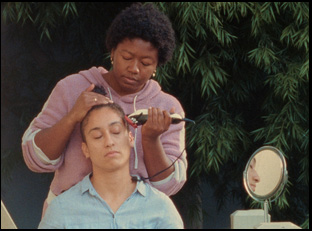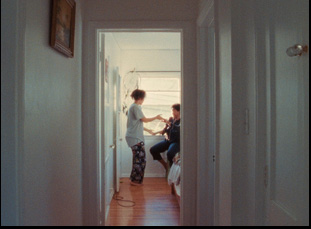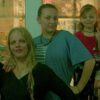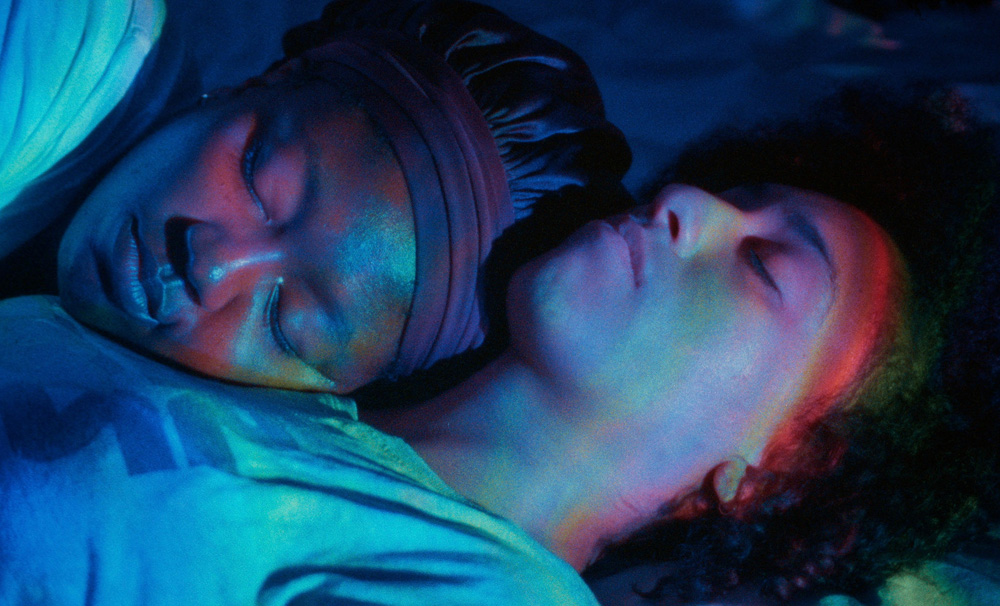“I feel like our love has its own galaxy,” someone can be overheard cooing in “Hold Me Close,” Aurora Brachman and Latajh Simmons-Weaver tender portrait of a couple that has appeared to have cracked open the secrets of the universe in finding their way to one another. Unfolding presumably on a lazy weekend afternoon, Corinne and Tiana aren’t rushed to get out of bed and want to take their time doing their mundane morning routine such as brushing their teeth and picking out clothes when it means a little more time together. At the top of an airy duplex, flowers are arranged, a game of chess is commenced and the two realize they’ve become “an ice cream pint-sharing couple” to their mild chagrin this early in their relationship, amused by how unfamiliar it feels to be this comfortable.
It becomes a privilege to even get to spend 20 minutes with the two in Brachman and Simmons-Weaver’s short doc, in which scenes from their love nest are presented in parallel with discussions they’ve had over a much-longer span of time about all the questions that their relationship has raised as two Black queer women. Frank about the individual self-doubt that has crept in as they dodge questions from parents about potential offspring and the pressure they feel from society in general to fit a certain stereotype and the unusual level of attention they receive, the open dialogue is a sign of their love as much as any other display of affection when they can be completely honest with each other. Filmed as gently by Brachman, serving as her own cinematographer in addition to co-directing, as the conversation flows between Corinne and Tiana, the film lets you fall in love with everything about it, becoming a cocoon in a world that tends to be more cruel than kind and insists these warm pockets still exist.
On the eve of the film’s premiere at Sundance as part of the Documentary Shorts Program, Brachman and Simmons-Weaver, who make a dynamic duo in both their professional and personal lives, spoke about their desire to present a couple that had rarely graced the big screen before, finding such a radiant pair to put front and center and bringing out the beauty in their humble home.

Aurora Brachman: It started with an idea that I had many years ago. I was coming into my queerness and it was really liberating, and I was in relationships with people of various races, but never another black woman. And I started fantasizing, “What would that be like? Someone who knows exactly what it feels like to move through the world in my skin.” Then a couple of years ago, Tajh and I began dating and the film came back to mind. I was processing the fact that we had no blueprint for a relationship like ours and I proposed to Tajh, “Would you want to co-direct this kernel of an idea that I have?” And Tajh said “Yes,” and we didn’t have the couple [for the film] in mind initially, but [Corinne and Tiana] were actually the first couple that we met with and we had a conversation with them and we were like, “You are amazing. You’re the couple.” It was just so clear.
LaTajh Simmons-Weaver: We were having a hard time finding two black women in a relationship, but we went out to dinner with them and just witnessed the love that they had. They were head over heels for each other and both had such good ways of communicating with each other and you could tell they really cared about each other. That’s what we were looking for.
Aurora Brachman: And the most exciting part was their enthusiasm for the project. They were so enthusiastic about the possibility of documenting their relationship. Having that buy-in from the people that you collaborate with in a documentary is so critical and they felt like there was a value to be gained for themselves by having this documentation of a special time in their lives. I also love that they understood our intention and our vision and wanted to be a part of it.
It’s an ingenious formal approach you take in separating the audio from the visual to create a kind of omniscient, dreamlike quality to a lazy day at their house. Was that foundational?
Aurora Brachman: It was pretty foundational. There was a period of time where we [wondered], would we just be in their house with a camera for extended periods of time? But then pretty quickly we landed on the idea, “Okay, we’re going to teach them how to use these mics. That way we can really be a fly on the wall in this relationship. There is no sense of performativity. There’s no self-consciousness.” The other great part about having them record themselves was that they also got a lot of autonomy. We were very conscious of having as much intimacy as possible, but also make them feel safe and there is nothing that’s being witnessed that they’re not consenting to.
Also pretty foundational was this idea that the film would be all of these wide, locked-off tableaus of the couple in different rooms of their home. We wanted to create a space that could allow for such a dialogue-heavy film and to allow you to lose yourself in the conversations and have the visuals just be complimentary. It was totally an experiment and we didn’t know until the edit if it was going to work. We were like “Crap, are we going to have to film a whole bunch of other stuff at the end because this sucks?” But then very quickly it clicked.
LaTajh Simmons-Weaver: Yeah, the idea was to remove us completely so that we can get them at their most vulnerable and intimate, and I think that really came through in the audio. We were not present — no one was — so we’re hearing their intimacy and witnessing that from the raw perspective. And even the choice to do these locked-off shots, we were far away from them and not moving a ton, so they’re still keeping that intimate space and they forget that there’s us being the camera crew there, so everything was to make sure we get the rawest moments from them.
Aurora Brachman: Yeah, and I shot the film, Tajh AC’d the film, so it was just us. No one else was present and it was a very safe environment that we created with them.

LaTajh Simmons-Weaver: I mean, they have the most beautiful home and that window [from their second floor], I remember when we went to the house and we’re just like, “We are filming here.”
Aurora Brachman: Yeah, we had to film with them outside this window. It was thrilling for me because my style as a cinematographer, I like to shoot with very clean lines and I love symmetry. I feel so proud of the film visually because I feel it is such an expression of my taste and to come into their home and see the environment that was already there organically, it really is just their home as it is. But how many beautiful hallways and doorways and the windows, there was so much room for exploration. It was also really nice to give ourselves the creative constraint of only [filming] inside the home, aside from the shot of the window, that was also just so incredibly beautiful.
Was there anything that happened that changed your ideas of what this was?
Aurora Brachman: Honestly, it was Corrine and Tiana, the couple. They really shifted the film in a beautiful way — the way that they interact with one another, the space they hold their patience and their compassion was really phenomenal and they really set the tone for the film. Of course, that’s obvious because they’re in it, but we didn’t know that before we had met them and a different couple would have created a completely different kind of film. We had intended originally to make a film about a couple that was very established and together for a long time, but Corrine and Tiana are a newer couple, so that was also very special because we were able to capture their love when it was still very much in the honeymoon phase. We also get to witness them navigating [certain] conversations for the very first time and it’s a love that is just so effusive. That was really beautiful and really changed the film in a way that we didn’t expect.
LaTajh Simmons-Weaver: Yeah, Corrine and Tiana really set the tone for what this film was. And there’s only so much you could do as a filmmaker. You can bring your craft and your creativity, but that intimacy and love that they brought to it, we got really lucky to be able to make a film with them.
Aurora Brachman: That was the art.
LaTajh Simmons-Weaver: Yeah, that was the art.
What was it like getting the call from Sundance that the film would be screening there?
LaTajh Simmons-Weaver: We had high hopes for it, but I accepted the fact [if we didn’t]. I thought, “If this film doesn’t get into Sundance, I know that we made the best film that we could possibly make.” And we love the film. We didn’t compromise anything. So we [thought] “If it doesn’t get in, I feel good about the film that we made.” But then we got the call…
Aurora Brachman: We’re working on another project together right now and we had come back from a long shoot day for that. I had a missed call, but I saw that the name on the call was from a Sundance programmer. And at this point, I had been checking my Vimeo stats and there were not very many views on the film, so I [thought], “We’re not getting into Sundance.” I had accepted it. But then I saw that phone number and I called them back and I come over to Tajh, and I put her on speaker and she told us on the phone and I started bawling.
LaTajh Simmons-Weaver: Yeah, we were so proud.
Aurora Brachman: We called the couple, we called our funders, I called my mom.
LaTajh Simmons-Weaver: Yeah, we called the couple and they happened to be on a camping trip together, coming back and I was just like, “This is so epic.”
Aurora Brachman: Yeah, it was amazing. Sometimes incredible moments happen in life and they don’t really hit you and it’s a disappointment that you don’t get to experience the flood of emotions. But this was one of those moments in life that it was all crystallized in that moment and it felt incredible and so validating.
“Hold Me Close” will screen at the Sundance Film Festival as part of the Documentary Shorts Program on January 25th at 11:30 am at the Library Center Theatre, January 26th at 1:10 pm at the Megaplex Redstone, January 28th at 3 pm at the Broadway Centre Cinemas in Salt Lake City, February 1st at 8:10 pm at the Megaplex Redstone. It will also be available online from January 30th through February 2nd via Sundance’s virtual platform.




